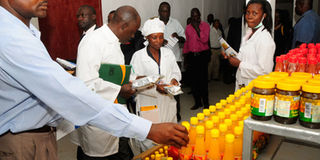Untaxed Egyptian juice imports draw fire from local producers

Government officials take a tour of a local juice factory. Manufacturers say they cannot compete with imports that are tax-free. PHOTO BY FAISWAL KASIRYE
What you need to know:
Exemption. Exempted imports will subject local produce to unfair competition
Kampala.
Trade agreement exempting Egypt’s products, particularly processed juice imports from being charged Value Added Tax (VAT) will cripple the juice sub-sector, the industry players have warned.
The red flag was raised by Jakana Foods, a major scale commercial producer of natural fruit juices in the country, during a meeting between beverage makers and juice manufactures with Uganda National Bureau of Standards.
However, the Permanent Secretary of the Ministry of Trade, Amb Julius Onen, in an interview yesterday denied the claims, saying there is no such arrangement in place.
During the meeting attended by more than 150 industry players, the general manager of Jakana Foods, Ms Meg Jaquay, last week wondered how local industry players will favourably compete with the likes of Egypt who have a free trade agreement with Uganda.
She said: “How can we compete with Egypt who has a free trade agreement with Uganda, exempting them from VAT?”
In a phone interview yesterday, the secretary-general of Uganda Waters and Juice Manufacturers Association, Mr Morgan Bonna Gyaviira, not only confirmed that the agreement has already been signed between the two countries - Uganda and Egypt, but was also afraid that if implemented, it will see the death of the nascent juice industry.
He said: “We are engaging the Ministry of Trade with a view to understand how this will work and its impact on the industry.”
He continued: “We believe this move has the potential to kill the growth of the local industry whose cost of production unlike the Egyptian factories, is already too high.”
According to Mr Onen, beside the benefits accruing to Egyptunder the Common Market for Eastern and Southern Africa (Comesa) Free Trade Area (FTA), there is no other related arrangement that has been entered with the North African country.
Beginning last year when Uganda became a member of Comesa, all FTA member countries, among them Egypt, are entitled to free access to her market and vice versa.
industry outlook for non-alcohol drinks
These include carbonated soft drinks, fruit juices and bottled water. The biggest soft drink producers are franchises of big international companies Coca-cola and Pepsi cola.
Through their operations in Uganda, soft drink and bottled water manufacturers are supplying Rwanda, Burundi, South Sudan and Eastern Congo.
In 2010, the Bill and Melinda Gates foundation committed $1.4bn to strengthen the agricultural value chain in Africa. By 2010, the fruit juice industry in Uganda had grown 300 per cent since 2005.
With the set-up of supermarkets in Uganda, bottled drinks are becoming increasingly popular with positive forecasts.
[Open to expo, an online resource]




